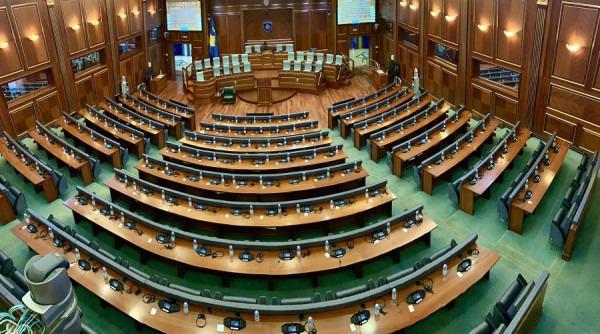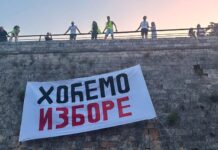Picture of Kosova’s parliament/ From archive
The parliamentary elections in Kosova occurred on February 9, 2025. As of now, it has been four months since the elections took place and over two and a half months since the results were certified, revealing that the Vetëvendosje Movement emerged victorious with 42.3% of the votes. Following the certification of the results, there have been 31 sessions convened in a bid to establish the Kosova Assembly. Thirty-one attempts. The outcome? Every single one has fallen short. For the past four months, Kosova has been without fully functioning state institutions. Not merely four days, nor just four weeks, but an entire span of four months has elapsed now.
We spoke with Besar Gërgi, a researcher at the Group for Political and Legal Studies, who offered a different perspective on the current state of the crisis. While most commenters are clearly blaming the winning party and the party with the fewest votes for the impossibility of forming a governing coalition, he also pointed out that two factors should be considered when highlighting the causes of the institutional crisis we are in. The two factors are the frozen seats of the Srpska Lista in the Assembly, which has been absent from political life for some time now, as well as the refusal of the third most voted party to form a coalition with either the winning party or one that came in second.
“The electoral system in Kosova determines a parliament with 120 seats, but Albanian parties compete for 100. So, the first problem begins in the design, when parties are forced to win 61 deputies out of 100. When this becomes practically impossible, coalitions with representatives of non-majority communities who have 20 guaranteed seats come into play. Traditionally, a party that has won 41 seats has been able to get the support of 20 minority deputies to form a government. However, with the creation of the Serbian List after the Brussels Agreement, and especially its compromise with the participation of its deputy leader in the terrorist attack in Banjska, the coalition with the nine deputies of the Serbian List is considered radioactive. Therefore, today an Albanian party or coalition that aims to form a government must have 51 votes. LVV has only 48 and simply ignores the gap of three votes and behaves as if it has the numbers are theoretically held by the united opposition, which has 52 MPs combined. But this opposition is not united because the third party, LDK — which is in the position of ‘king maker’ — refuses to play its role and does not enter any coalition. This situation, namely the exclusion of the Serbian List from political life as well as the refusal of the LDK to enter any coalition, has brought us to a situation where neither the LVV as the nominal winner can form a government, nor the PDK as the second party has a real chance of forming a government”, said Gërgi.
He voiced doubts about the likelihood of early elections leading to political stability, given the potential results they might yield if conducted.
“The solution is between the transitional government proposed by the LDK and early elections. However, with an LVV that has difficulty winning 51 deputies, and with a divided opposition, new elections, regardless of their results, are unlikely to produce stability”.
When asked about the repercussions of the ongoing crisis in Kosova, he highlighted, among other points, the failure to ratify agreements that could secure hundreds of millions of euros for the state, noting that without a functioning assembly, these agreements cannot be approved. He further expressed his belief that the ongoing stalemate is tarnishing the international image of Kosova.
“Kosova is already failing to fulfill some of its main obligations as a state on the international level. Its parliament is unable to ratify the 883-million-euro agreement with the EU, and the incumbent government is unable to participate in serious negotiations in Brussels with Serbia. A government in office with a non-functional parliament cannot ensure progress in the application for membership in the EU and the CoE or take any serious steps toward NATO. Therefore, the government is creating the image of a fragile state, without political maturity from its leaders. Considering the sensitive circumstances in which the state of Kosova was created in 2008, the present situation reinforces the revisionist narratives that Kosova is a failed state. Therefore, the lack of leadership is damaging Kosova’s international image, paralyzing its executive and legislative branches, and impoverishing ordinary citizens,” concluded Gërgi for Perspektiva Plus.
Marjan Gjomarkaj, 24 years old, a student finishing his studies at the history department of the University of Pristina, blamed the opposition for the situation: “This situation has never been seen before. But I think the opposition is being unconstructive and blocking the process”.
Unlike Marjan, Tina, a second-year student in the political science department at the University of Pristina, claims that the citizens are the ones most impacted by this case and that there is a notable lack of sincere and responsible communication between the opposition and the ruling party.
“So, I think that the situation of the deadlock in the Kosova’s Assembly is a reflection of the lack of sincere and responsible dialogue between the position and the opposition because often these two important roles in the Assembly forget what they are called to do and what they were voted for in the Parliament, and this deadlock is directly affecting the lives of citizens because laws that are in the interests of citizens are being delayed and personal and party interests are coming before those of citizens. The Assembly should serve as a venue for constructive debate, where individuals discuss which laws are beneficial for the country, rather than becoming a site of obstacles and political resentment. In a place of continuous confrontations, a practical culture should be created where even criticisms are put into the function of improving governance, which is already evident that we are very far from this democratic culture,” said Tina for Perspektiva.
Writes: Hanmie Lohaj














